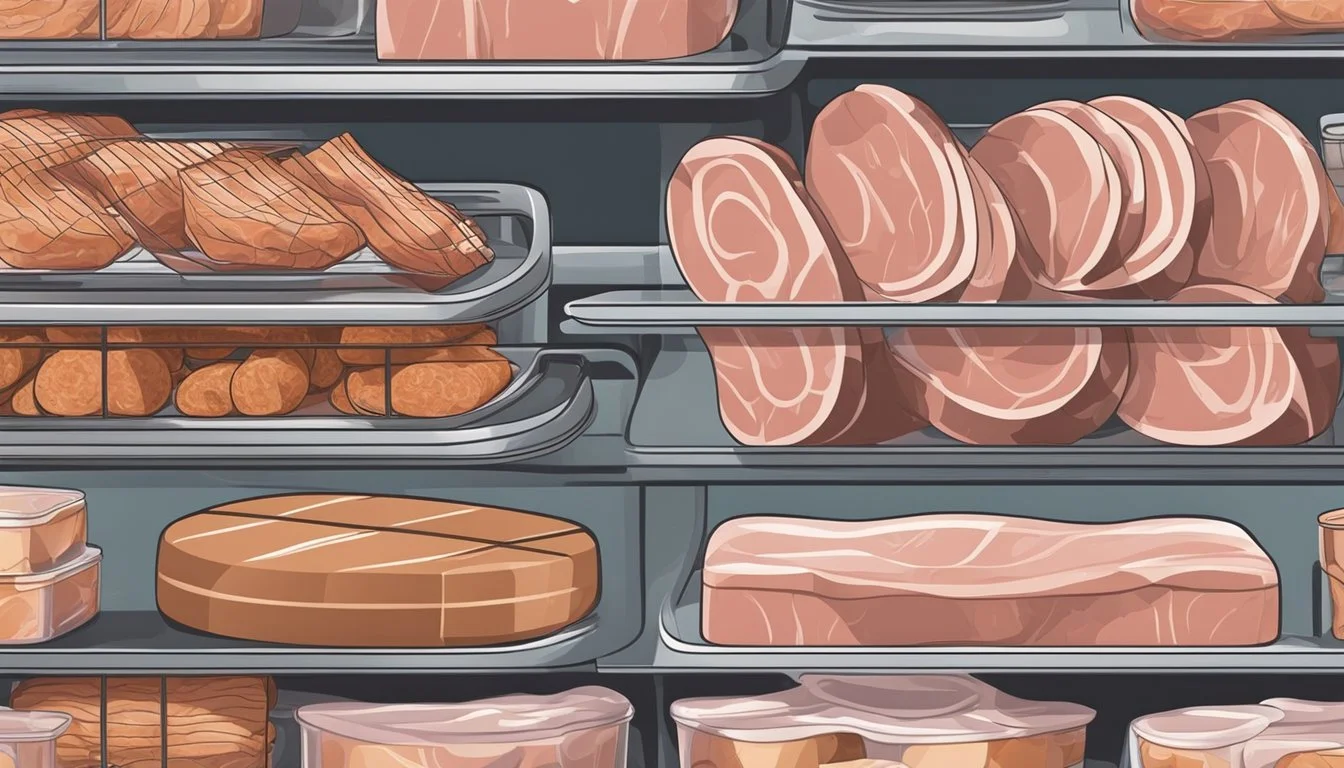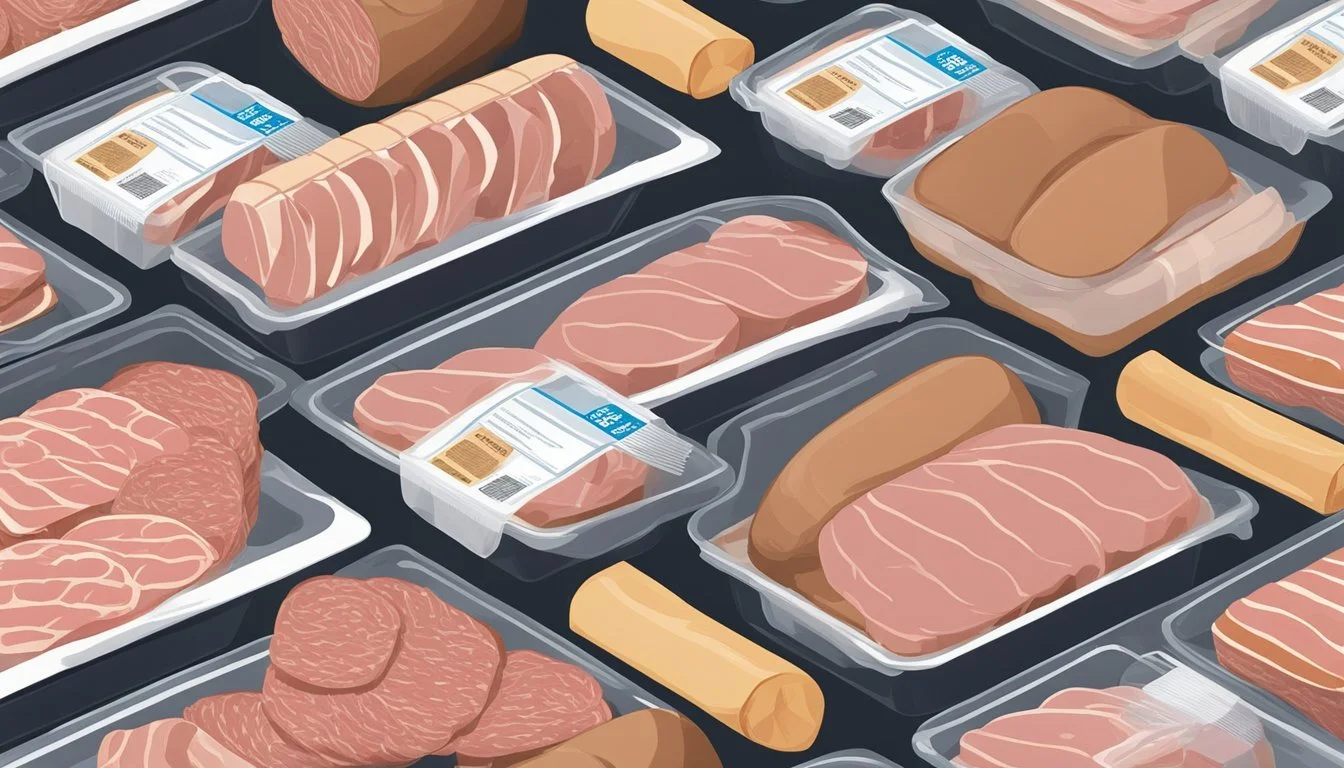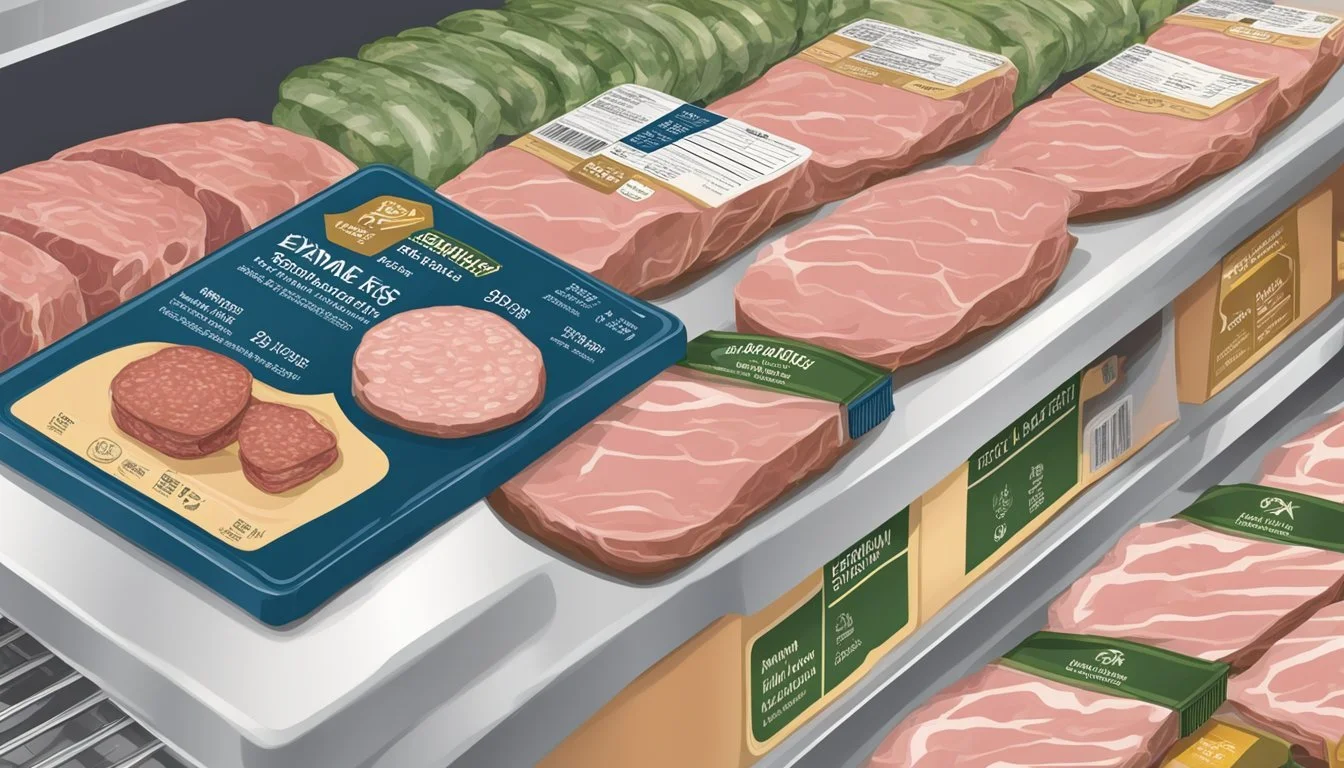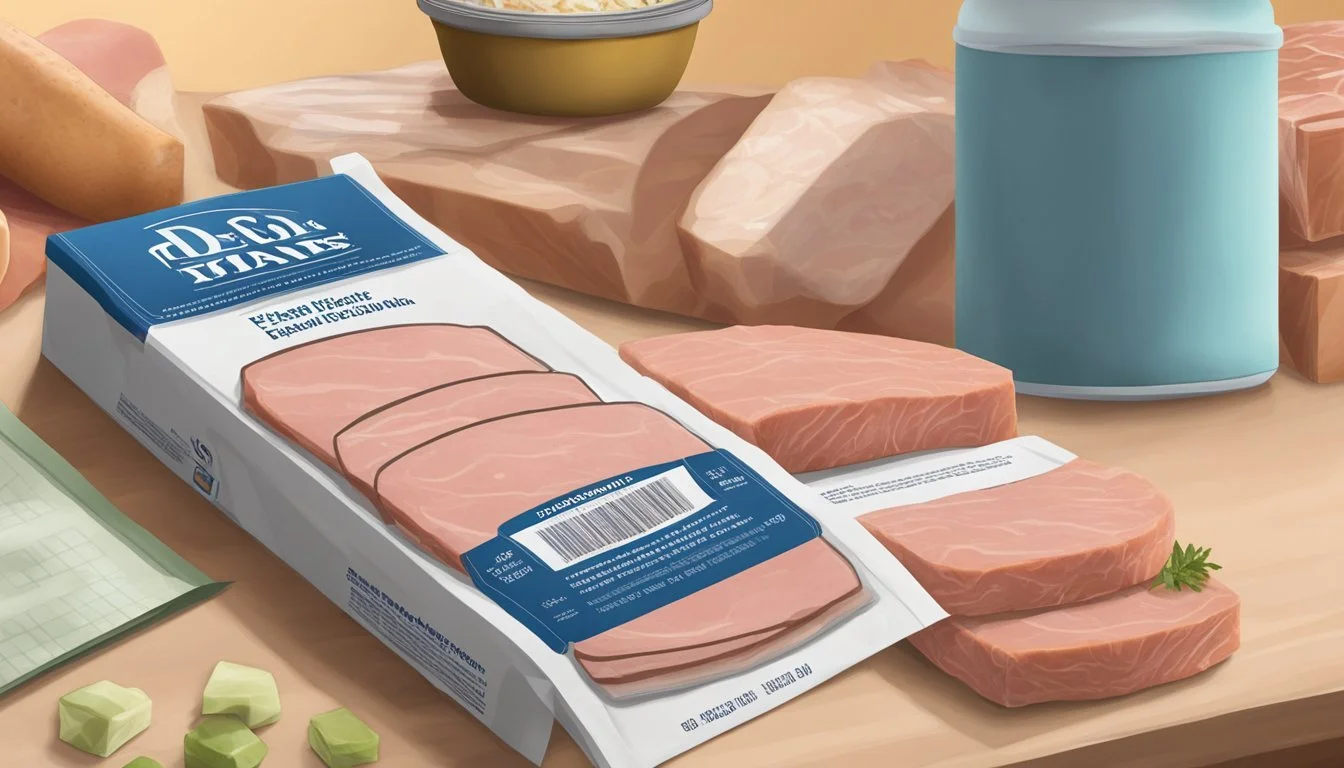How Long Do Deli Meats Last?
Shelf Life and Storage Tips
When considering the shelf life of deli meats (how long do deli meats last?), two main types are typically discussed: pre-packaged and freshly sliced from the deli counter. The longevity of these products in the refrigerator varies. Pre-packaged deli meats, when unopened and properly stored, can last about two weeks, while freshly sliced deli meats tend to have a shorter refrigerator life of three to five days once they're brought home from the store.
The specifics of storage play a crucial role in how long deli meats remain edible. Unopened packaged deli meats can last slightly beyond the 'best before' date if they're kept sealed and refrigerated, while their opened counterparts should be consumed within the recommended time frame to ensure safety and quality. It's essential to store these meats at or below 40 °F, as recommended by food safety guidelines.
For those looking to extend the shelf life of their deli meats, freezing offers a viable option. Deli meats can generally be frozen for one to two months without significant loss of quality. However, it's important to note that the texture and taste of the meat may be affected after freezing and thawing. Regardless of the type of deli meat, consumers should always perform a visual and olfactory check for spoilage before consuming.
Understanding Deli Meats
Deli meats, a staple in sandwiches and platters, vary significantly in shelf life and safety based on preservation methods and packaging. Knowing the difference between fresh and pre-packaged options, as well as the various preservation techniques, can guide you to make informed choices.
Fresh vs Pre-Packaged Deli Meat
Fresh deli meat, typically procured from the deli counter, is sliced in front of the customer and lacks the preservatives found in pre-packaged alternatives. These meats, including turkey (What wine goes well with turkey?), ham, roast beef, and capicola, should be consumed within 3-5 days of purchase. On the contrary, pre-packaged deli meat is vacuum-sealed and often contains preservatives that extend its shelf life. Unopened, these meats—ranging from bologna to genoa salami—can last up to two weeks in the refrigerator. However, once opened, the shelf life aligns with that of freshly sliced meats.
Type Shelf Life (Unopened) Shelf Life (Opened) Fresh Deli Meat N/A 3-5 days Pre-Packaged Up to 2 weeks 3-5 days
Types of Deli Meat Preservation
Deli meats come in various forms such as whole cuts, processed meats, and fermented or cured meats (What wine goes well with cured meats?). Whole cuts, like roast beef, are cooked and then sliced; they contain fewer preservatives. Processed meats, such as bologna and cooked ham, are made from ground or chopped meat that is formed and then cooked, often containing additives for flavor and preservation. Cured meats, like prosciutto and capicola, use salt, brine, or fermentation to extend shelf life and enhance flavor. Fermented meats, including some types of salami and pepperoni, rely on a process involving beneficial bacteria to both preserve the meat and impart a distinct taste.
Type Preservatives Example Whole Cuts Few to None Roast Beef Processed Meats Added Bologna, Ham Cured Meats Salt, Brine Prosciutto Fermented Meats Beneficial Bacteria Salami, Pepperoni
Proper Storage Techniques
Proper storage of deli meats maximizes shelf life and ensures safety by maintaining ideal conditions to retard bacterial growth. Below are specific measures one can take to store deli meats correctly both in refrigeration and freezing, as well as the handling practices to observe.
Refrigeration and Freezing
Refrigeration: Deli meats should be stored in the refrigerator at temperatures at or below 40°F. Once opened, meats should be consumed within three to five days. Unopened, pre-packaged deli meats can last about two weeks under these conditions. For optimal storage, wrapping deli meats in plastic wrap, aluminum foil, or placing them in resealable bags can help maintain quality and prevent moisture loss.
Best Practices for Refrigeration:
Store at <= 40°F
Consume opened meats within 3-5 days
Use moisture-proof wraps or containers
Freezing: Deli meats can be frozen for long-term storage. Freezer temperatures should be set at 0°F or lower. Frozen deli meats are best used within three to four months to maintain quality. Use freezer bags or airtight containers designed for freezer storage to ensure the prevention of freezer burn and oxidation.
Best Practices for Freezing:
Store at 0°F or lower
Use within 3-4 months
Protect with airtight packaging
Handling and Utensils
Proper handling is crucial to prevent cross-contamination and extend the shelf life of deli meats. Always use clean utensils to handle the meats to avoid introducing bacteria. When storing, ensure that meats are sealed tightly to minimize the exposure to air.
Best Practices for Handling:
Use clean utensils for serving and storage
Seal tightly to limit air exposure
Avoid direct contact with hands to reduce contamination risks
Shelf Life of Deli Meats
The longevity of deli meats in a consumer's refrigerator varies depending on several factors, including whether the meat is pre-packaged and unopened, or if it's been opened and exposed to air. Storage practices and adherence to expiration and sell-by dates also play a crucial role in determining shelf life.
Pre-Packaged Deli Meats: Unopened pre-packaged deli meats typically last for two weeks in the refrigerator if stored properly. Consumers should always note the sell-by date as a reference for peak quality.
Opened Deli Meats: Once opened, deli meats should be consumed within 3-5 days. These meats are exposed to air and potential contaminants, thus shortening their safe consumption window.
Best Practices:
Store deli meats at or below 40°F.
Keep meats in airtight containers to limit exposure to air.
Shelf Life Overview:
Deli Meat Type Unopened Shelf Life Opened Shelf Life Pre-packaged Salami 3 weeks 2 weeks Pre-packaged Deli Turkey 5-6 days 3-5 days Hard Salami* 2-3 months 2-3 weeks Pepperoni 6-8 months 2-3 weeks
*Hard salami refers to cured meats like Genoa or dry salami that have an extended shelf life due to the curing process compared to regular packaged meats.
Shelf life can be shortened if deli meats are not stored properly. Consumers are encouraged to inspect meats for freshness and adhere to printed dates to ensure the safety and quality of the product.
Factors Affecting Deli Meat Freshness
Preserving the freshness of deli meats depends on a number of variables. Here are some of the primary factors:
Temperature Control: Deli meats should be kept refrigerated at or below 40°F (4°C) consistently. Temperatures above this threshold can promote bacterial growth, reducing freshness and safety.
Packaging: Proper packaging is critical to extending the shelf life of deli meats. Airtight packaging reduces exposure to air and moisture, which are factors that can degrade quality and freshness.
Moisture: Excess moisture in the packaging can lead to spoilage. Deli meats should be kept dry to maintain freshness. Any presence of water or other liquids within the package should be avoided, as it can be a breeding ground for bacteria.
Air Exposure: Limiting the exposure of deli meats to air is important to prevent the oxidation process, which can affect taste and freshness. Once the original packaging is opened, the shelf life decreases.
The table below summarizes the key factors that influence deli meat freshness:
Factor Description Impact on Freshness Temperature Keeping meats cold inhibits bacterial growth. Ensures safety and extends life. Packaging Airtight packaging protects from contaminants. Preserves quality and freshness. Moisture Dry conditions reduce spoilage. Prevents bacterial growth. Air Minimal exposure to air keeps meat fresher longer. Reduces oxidation and spoilage.
Individuals should always inspect deli meats for signs of spoilage such as off-odors, discoloration, or a slimy texture, and adhere to the "use-by" dates provided by the manufacturer to ensure quality and safety.
Identifying Spoilage and Food Safety
When assessing deli meats for spoilage, it's crucial to understand the risks. Spoiled deli meat can harbor harmful bacteria such as Listeria, which can lead to foodborne illnesses. To ensure food safety, consumers need to be vigilant about recognizing the signs of spoilage and preventing cross-contamination.
Signs of Spoilage:
Discoloration: Look for any changes in color, such as graying or turning brown, which indicate spoilage.
Texture Changes: Sliminess or a tacky feel are common indicators of microbial growth.
Odor: A sour or off smell is a strong sign that deli meat should be discarded.
Sign of Spoilage Description Discoloration Changes to grayish or brown hues Texture Unusual sliminess or stickiness Odor Off or sour smell, not typical of fresh meat
To prevent spoilage, consumers should adhere to the following food safety practices:
Store deli meats at or below 40°F to inhibit bacterial growth.
Use separate utensils and cutting boards for uncooked and cooked foods to avoid cross-contamination.
Consume or properly store deli meats within recommended time frames: 3-5 days for meats sliced at the deli counter, and within a week after pre-packaged meats are opened.
By being alert to these signs and exercising proper hygienic practices, consumers can reduce the risk of contracting foodborne illnesses linked to spoiled deli meats. Regular checks for discoloration, texture changes, and unusual odors are key to identifying spoiled deli meat and ensuring food safety.
Best Practices for Extending Shelf Life
Proper storage techniques are key in preserving the shelf life of deli meats and ensuring they remain safe to eat. To maintain optimal freshness, it is important to follow these guidelines:
Temperature: Deli meats should be stored at a consistent temperature of 40°F (4°C) or lower. This temperature range is crucial in slowing bacterial growth and preserving quality.
Packaging:
For unopened packages, use the deli's packaging which is designed to keep air and bacteria out until the expiry date.
Once opened, wrap sliced meats tightly using a plastic bag or plastic wrap to minimize air exposure.
Placement: Place deli meats in the coldest part of the refrigerator, typically at the back, away from the door.
Proper Storage Duration:
Unopened Package: These can last about two weeks if the refrigerator is kept at the proper temperature.
Opened Package: Once opened, consume sliced meats within five days for the best quality and safety.
Hygiene Practices:
Always wash hands before and after handling deli meats.
Use clean utensils and cutting boards to prevent cross-contamination.
For extended storage options, consider using a vacuum sealer for deli meats. This method can prolong the freshness by removing air from the environment of the sliced meats. However, it is important to not rely solely on storage practices to determine if a deli meat is still good; always check for signs of spoilage such as an off smell, sliminess, or discoloration.
Understanding Expiration Dates
When navigating the shelf life of deli meats, understanding the various types of expiration dates is crucial. There are typically three different dates that consumers may encounter on deli meat packaging:
Sell-By Date: This date indicates to the store how long to display the product for sale. It is not a safety-related date. The purpose is to ensure inventory turnover at the store level to provide consumers with fresh products.
Use-By Date: This is the last date that the manufacturer vouches for the product's peak quality. After this date, the quality of the deli meat may diminish, but it may still be safe to consume if it has been properly stored.
Expiration Date: If provided by the manufacturer, this date reveals when the deli meat should no longer be eaten. It is based on what the manufacturer deems to be the end of the product’s optimum quality and safety.
Type of Date Purpose Impact on Quality and Safety Sell-By Date For inventory turnover in stores Not directly related to safety Use-By Date Indicates peak quality per the manufacturer Quality may drop post-date, safety varies Expiration Date Advises on end of consumption period Safety and quality may be compromised after this date
It's important for consumers to scrutinize these dates, as they are not solely indicators of food safety. Deli meats can often be safe to consume after the sell-by date if they have been handled and stored properly. However, use-by and expiration dates should be taken more seriously, as consuming products past these dates could pose a risk. If the package is opened or the meat is freshly sliced, the safe consumption period is usually much shorter, typically 3-5 days. Always perform a visual and olfactory inspection of the deli meat if you are nearing or have surpassed the provided dates, as spoilage may present itself through changes in texture, color, or odor.
Effect of Freezing on Deli Meats
When it comes to preserving deli meats, freezing is a viable method for extending their shelf life. Freezing deli meats allows individuals to keep them for a longer period, usually up to two months, while maintaining safety and a degree of quality. One should store these meats in a freezer at 0°F (-18°C) to ensure their indefinite safety. However, for optimal eating quality, consumption within 1-2 months of freezing is recommended.
Upon freezing, the texture of deli meats can be affected. Cured meats like bologna, pepperoni, or sausage tend to freeze well, while others with higher moisture content may experience textural changes post-thawing. It's critical to properly package deli meats to prevent freezer burn, which can degrade quality by dehydrating the surface of the food and causing it to become tough.
Packaging Methods for Freezing:
Pre-packaged Deli Meats: Place unopened packages directly into the freezer. An additional protective layer, such as plastic wrap or aluminum foil, can provide a barrier against freezer burn.
Opened or Freshly Sliced Meats: Wrap these tightly in plastic wrap or freezer paper before freezing, removing as much air as possible to preserve quality.
When ready to consume, thawed deli meats should be managed carefully. Thawing should occur in the refrigerator, not at room temperature, to maintain safety. Once thawed, they should be consumed relatively quickly to avoid potential spoilage and ensure the best taste and texture.
Remember that while freezing extends the life of deli meats, starting with a fresh, high-quality product is essential for the best results after thawing.
Usage Ideas for Deli Meats
Deli meats, also known as lunch meat or cold cuts, are versatile and ready-to-eat proteins that can add flavor and substance to a variety of dishes. They come in an array of flavors and types, making them a convenient ingredient for quick meals.
For Sandwiches:
Classic Sandwich: Layer turkey, ham, or roast beef with cheese, lettuce, and tomatoes.
Wrap: Use a tortilla to wrap up chicken or turkey with fresh salad greens and a light dressing.
Grilled Panini: Make a panini with salami, ham, provolone cheese, and pickles.
Salads:
Chef's Salad: Top a bed of mixed greens with strips of ham, turkey, and cheese.
Italian Salad: Incorporate salami and pepperoni into a salad with olives, mozzarella, and cherry tomatoes.
More Ideas:
Pizza Topping: Chop cold cuts to use as protein-rich toppings on homemade pizzas.
Antipasto: Create an antipasto platter with various cold cuts, cheese, olives, and artichokes (What wine goes well with artichokes?) .
Omelets: Dice ham or turkey and add to omelets for a satisfying breakfast.
Utilizing deli meats in these ways can enhance meals with extra protein and provide enjoyable eating experiences. They serve as a flavorful component in quick and easy meal preparations.
Health Considerations and Nutritional Information
Deli meats, also known as lunch meats or cold cuts, are convenient protein sources and are used in a variety of meals. They usually contain proteins, vitamins, and minerals that contribute to a balanced diet, but one must be mindful of their nutritional content.
Protein: Deli meats are rich in protein, essential for muscle repair and growth.
Food Safety is paramount when dealing with deli meats to prevent the growth of harmful bacteria such as Listeria monocytogenes. The risk of contamination can increase if deli meats are not stored or handled properly. It's important to keep them refrigerated and consume them within their intended shelf life.
Storage temperature: Below 40°F (4°C)
Shelf life (opened): 3-7 days
Shelf life (unopened): Up to 2 weeks
Deli meats often contain preservatives, such as nitrates or nitrites, which inhibit bacterial growth and enhance flavor and color. However, consumption of these additives should be done with consideration due to potential health risks when consumed in high amounts.
When considering nutrition, deli meats can be high in sodium and saturated fats. Consumers should look at the labels and opt for low-sodium and leaner cuts to make healthier choices.
Nutrients: Check for sodium content and type of meat cut
Serving size: Be cognizant of portioning
Overall, while deli meats offer convenience and flavor, mindful consumption aligned with food safety practices and nutritional awareness is essential for maintaining a balanced diet and minimizing health risks.
Practical Tips for Buying Deli Meats
When purchasing deli meats from a deli counter, freshness and quality are paramount. Buyers should look for bright, natural colors and avoid meats that appear slimy or have an off smell. It's beneficial to ask for a sample to assess the flavor and texture, ensuring the selected product meets expectations.
Buy Fresh: Opt for meats sliced at the deli counter rather than pre-packaged options. This way, one receives slices that are fresher and possibly of a higher quality.
Check Labels: For pre-packaged deli meats, always check the expiration date. Choose packages with the farthest out 'use by' date to maximize freshness.
Type of Meat Expected Freshness Period* Turkey 3-5 days after opening Ham 3-5 days after opening Salami 5-7 days after opening Roast Beef 3-5 days after opening
*Assuming refrigeration at 40°F or below.
Consume Quickly: Once opened, deli meats should ideally be consumed within 3 to 5 days. If one prefers to stock up, it's important to freeze any meat that won't be eaten within that time frame.
Variety and Flavors: Explore different types of meat and flavors to keep things interesting. However, be cautious not to buy more than what can be consumed in a few days to prevent waste and to enjoy the slices at their best quality.
By adhering to these guidelines, consumers can ensure they're buying deli meats that are not only enjoyable in terms of flavors but also safe and fresh.
Deli Meat and the USDA Guidelines
The United States Department of Agriculture (USDA) provides guidelines to ensure food safety and to inform consumers on how to properly handle and store deli meats. Their recommendations come from a standpoint of minimizing the risk of foodborne illness, with a focus on temperature control and proper storage times.
Unopened Packages:
Refrigerator: Can be kept for up to two weeks.
Freezer: Freezing can extend their shelf life to one to two months for optimal quality.
Once the package is opened or deli meats are purchased fresh from a counter, the USDA advises that these items should be consumed within three to five days when kept in the refrigerator.
It is essential to store deli meats at 40°F or below to prevent the growth of harmful bacteria. The pH levels of deli meats are conducive to bacterial growth if not stored properly, making temperature control imperative.
The USDA underscores the importance of adhering to "use-by" dates if they are provided on the packaging. These dates are determined by the manufacturers and are based on quality and safety standards specific to the product. It's vital for consumers to observe these dates to ensure the safety of the deli meats they consume.
Storage Location Unopened Packages Opened Packages Refrigerator Up to 2 weeks 3 - 5 days Freezer 1 - 2 months Not recommended
The guidelines from the USDA serve as a resource for consumers to prevent foodborne illnesses associated with improper storage of deli meats. The key is to keep these products adequately chilled and to consume them within the recommended time frames.









